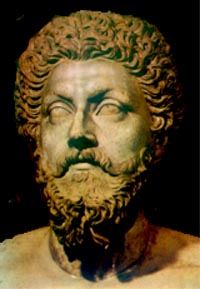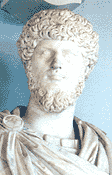|

JANUARY MEETING
MMI (2001) ANNALES
|
| Each year the format of our January meeting is the same: a report
of the Club’s performance over the past year is presented followed by an
open discussion of how performance can be improved. Traditionally,
we call this our Annales meeting named after the ancient Roman practice
in which the Pontiffs, the priests of the State religion, were required
to make a formal report (inscribed on bronze tablets) to the Senate and
the people of Rome of events of major importance throughout the Empire
that occurred during the previous year. While it is important to
look back at what we have done, like Janus we also believe that it is equally
important to look ahead and plan for the future.
The formal portion of the meeting will be limited to a brief ceremony
to install Carol Lozano as a new director and to vote on new member
applications. We will then proceed to reports on the Club’s financial
status, membership, member survey results, programs and activities, the
Club’s involvement with the Federation of Italian American Organizations
(FIAO), discussion on how to maintain continuous improvement of our Club,
plus any other issues members feel are of importance to the Club and to
the Italian-American community in general. This segment of the meeting
will be informal – no motions will be accepted, no votes taken, and no
decisions made.
|
|
Next Meeting Wednesday, January 16, 2002
Cocktails 6:30 PM - Dinner 7:00 PM
Da Baldo's Restaurant
RSVP Marie Wehrle
(314) 544-8899
or by
email
|

RECAP OF DECEMBER
MEETING
A SPECIAL CELEBRATION OF CHRISTMAS
|
The Italian Club’s Christmas celebration embraced a full
and varied program that evoked the heritage and spirit of an Italian Christmas.
The festive evening began with the Club’s own Panettone Players’
(Roger Gennari, Gloria Griffero, Dorotea Rossomanno-Phillips,
and Robert Liddy) English production of vignettes, from the Italian
play, Natale in Casa Cupiello, by Edoardo de Filippo, as
adapted by Dorotea Rossomanno-Phillips. The original play was first
presented in Naples on Christmas Day l93l, by the author’s own theatre
company. Eduardo, as he is simply known in Italy, was an acclaimed
award winning Neapolitan playwright, actor, director, filmmaker and producer
for stage, screen, and television. One of his most powerful themes
is the tragic necessity of denial, so much an element, not only of lower
class Neapolitan life, but of life in general.
The drama utilized time-honored Christmas rituals: Natale
– Christmas, and Casa – home and hearth. The annual building
of a new Presepio (crib) by the protagonist Luca Cupiello is the
central event of the play. Luca’s annual labor symbolizes his unconscious
desire to reconstruct his dysfunctional and anarchical family into a harmonious
family unit. At one point in the play Luca explains to Vittorio,
a friend of his son’s, that he is carrying on the tradition of his father
who used to build a Presepio each year for his children, and that he considers
it a bad omen if he does not do it as well. Luca’s wife, Concetta,
and their son, Tommasino, fail to understand his motive and they ridicule
him for it. Though the family is held together by love, there are
clashes and conflicts in the Cupiello household. Tommasino is lazy,
disrespectful, and overindulged by Concetta. He steals from his uncle,
Pasquale, who in turn steals from Luca. Ninuccia, the daughter, is
unfaithful to her devoted husband and plans to run off with Vittorio.
On Christmas Eve problems involving the various members
come out into the open and Luca is made painfully and completely aware
of
their reality. He finds the money that Tommasino had stolen from
Pasquale in Tommasino’s pocket and from the mark he had made on it earlier
realizes that it was his own money. Then Nicola walks in unexpectedly
and finds Vittorio forcibly kissing the now reluctant Ninuccia. A
fight ensues between the two men. Three days later, as a result of
that disastrous evening, Luca has become gravely ill, is bedridden, and
practically unconscious. The doctor expresses concern over the condition
of Luca’s heart. Tommasino now realizes how much he loves his father,
and what the annual building of the Presepio meant to him. Luca,
in his delirious state, asks Tommasino, as he did many times in the past,
if he likes the
Presepio.
Grief-stricken, Tommasino, who had always replied in the
negative, now tells his father that it is beautiful and that he loves it.
Luca, hearing this long desired reply from his son, gazes off into the
distance, as if following a magical vision. He sees a gigantic Presepio
with tiny people bustling towards it and little animals warming the Baby
Jesus, who is crying and struggling as any newborn. Luca, lost in
this vision, says to himself, “What a lovely Crib! What a pretty
pretty Crib!”
The play was followed by a dinner of superb quality and
taste carefully planned and prepared by Chef Baldo Gandolfo.
The seven-course dinner represented outstanding dishes from various regions
of Italy. After dinner, Prof. Tony Perrone gave a talented
and moving reading of the poem, La Befana, by Gino Mariani,
anticipating the arrival of La Befana herself, who distributed candies
to all present. Italian attendance prizes were enjoyed by the delighted
winners. The festive evening ended with a sing-a-long of the popular
Italian Christmas carol, Tu scendi dalle stelle led by a member
of St. Ambrose Church Choir.
|
|

L’ANGOLO DEL PRESIDENTE
By Gene Mariani |
BOARD APPOINTS LOZANO AS DIRECTOR
Carol Lozano was appointed as a Director of the Club at the December
Board meeting. Carol replaces Carolyn Stelzer who resigned
from her Director position for health reasons. Lozano will serve
the remainder of Stelzer’s term. The Board extends a warm welcome
to Carol and heartfelt thanks to Carolyn for the good judgment, sound advice,
cheerful cooperation, and the “lets roll up our sleeves and get to
work on this project” attitude which she always demonstrates so unselfishly
on behalf of the Club. We are looking forward to having her back
with us soon on a regular basis.
|
|
2002 DUES
|
| Your 2002 annual dues notice is included with this issue of La Rondine.
Dues are payable by January 31, 2002. You might note that the dues
amount for 2002 has reverted back to the annual $30 amount that has been
in effect for a number of years. For the past several years, all
club members have been receiving a $5 adjustment and were only paying $25
annually. The reason for this adjustment was to accomplish a gradual
phase-out of the new member application fee in a manner that would be fair
to all members who had paid it in the past. In effect, club members
have been given a rebate of their original application fee through the
annual $5 dues adjustments. Beginning in 2002, there will be no application
fee and all new and existing club members will be charged $30 annually.
By paying your dues promptly you will be helping us very much and your
support will be greatly appreciated. |
|
|
|
| |
|

ANNOUNCEMENTS
ITALIAN CLASSES TO BEGIN AT
SHAW
|
As a result of a financial grant provided by the Italian
Government through the offices of the Consul General of Italy in Chicago
and with the assistance of the Consulate’s Educational Officer Dott. Anna
Fiore and administrative support by the Shaw Community Education Center,
the Federation of Italian American Organizations (FIAO), of which the Italian
Club is a member, has initiated a program of weekly evening Italian
language classes starting in early February.
The classes will be held at the Shaw Center in the Hill
neighborhood. There will be three Beginning-Level Youth courses for
age groups corresponding to K-2, 3-5, 6-8 grade levels and also Adult Level
courses. Students (Youth and Adult) must pay an enrollment fee and
purchase the required text books. For more information on enrolling
as a student, contact Joseph Torrisi at (314) 776-4327 or email
Joseph.Torrisi@slps.org.
Interested in teaching in this program? Instructors
are needed to teach at both the Youth and Adult Levels. Compensation
will be $20 per class hour and instructors will become part-time employees
of the SL board of Education. Courses will be 10 weeks in duration,
for 2 hours per night, one night per week. Instructors must be knowledgeable
in the standard Italian language, must submit a written application, and
be available for an interview. A selection committee has been
established to review credentials and to interview instructor applicants.
For information on teaching in the program, contact Gene Mariani
at (314) 352-5484 or email emariani@aol.com.
|
|

ALBERTO ISIDORI
NAMED OUTSTANDING ENGINEER
|
Congratulations to member Alberto Isidori on the great honor
of being named by the prestigious Institute of Scientific Information as
one of the world's most noted researchers in the field of engineering.
Professor Isidori is a member of the engineering faculties of both the
University of Rome, the famous La Sapienza, and of Washington University
in St. Louis. He divides his teaching year between both institutions. |
|

Notes from
Italy(Submitted by Barbara Klein)
| THE EURO HAS ARRIVED! |
 On January
1, 2002, the much anticipated Euro has begun to circulate in the twelve
European nations which adopted it as their currency: Austria, Belgium,
Finland, France, Germany, Greece, Holland, Ireland, Luxembourg, Portugal,
Spain, and Italy. In addition, the Euro will be the currency used
in more than fifty other countries that had previously used the currency
of one of the above twelve countries, such as San Marino, the Vatican,
Andorra and Monaco. The symbol for the Euro is €, which represents
the “E” of Europe with two parallel slashes recalling the fifth letter
of the Greek alphabet. On January
1, 2002, the much anticipated Euro has begun to circulate in the twelve
European nations which adopted it as their currency: Austria, Belgium,
Finland, France, Germany, Greece, Holland, Ireland, Luxembourg, Portugal,
Spain, and Italy. In addition, the Euro will be the currency used
in more than fifty other countries that had previously used the currency
of one of the above twelve countries, such as San Marino, the Vatican,
Andorra and Monaco. The symbol for the Euro is €, which represents
the “E” of Europe with two parallel slashes recalling the fifth letter
of the Greek alphabet.
The new monetary system is similar to the dollar, with 100 cents comprising
a Euro. There are eight coins (click on denomination
to display coin, click back button on browser to return here) of
1,
2,
5,
10,
20
and 50 eurocent
or “centesimi” and a 1 and 2 euro coins (currently, there is no plural
for the word Euro). The face of the coins are the same throughout
the twelve countries, with the reverse unique to the issuing country, thus
for example, an image of the Colosseum is on the Italian 5 eurocent coin
and a portrait of Dante is on the 2 euro coin.
 There
are seven banknotes (click on denomination to display
banknote, click back button on browser to return here) of 5,
10,
20,
50,
100,
200
and 500 euro
denominations, each of a different color and images particularly significant
in European History. There
are seven banknotes (click on denomination to display
banknote, click back button on browser to return here) of 5,
10,
20,
50,
100,
200
and 500 euro
denominations, each of a different color and images particularly significant
in European History.
From January 1 until February 28, 2002, the lire will continue to circulate
and one can pay for purchases in lire or euro. On March 1, 2002,
the lire will no longer be acceptable as a method of payment. Anyone
still holding lire will have TEN years (until February 28, 2012) to change
them to euro at any Banca d’Italia WITHOUT a commission. The fixed
exchange rate is €1=1,936.27 lire.
For more information, check out the website at www.euro.tesoro.it
|
|



The Italian Club of St. Louis
|
|
|
|


| I capolavori della poesia italiana
41. Gabriele D’Annunzio (Pescara 1863 – Gardone
1938) pubblicò il suo primo libro di poesie all’età di 16
anni. Ebbe una vita avventurosa e si impose come modello nei salotti
borghesi e più tardi a livello nazionale, diventando l’emblema dell’Italia
fascista. Si cimentò nei vari generi letterari e fu poeta,
giornalista, tragediografo e romanziere di successo. Questa poesia
fa parte di una raccolta di liriche intitolata Laudi del cielo del mare
della terra e degli eroi in sette libri dedicati ciascuno a una stella
della costellazione Pleiade. Il progetto però si interruppe
dopo la pubblicazione dei primi quattro: Maia, Elettra, Alcione
(di cui La pioggia nel pineto fa parte) e Merope.
La pioggia nel pineto
di Gabriele d’Annunzio
Taci. Su le soglie
del bosco non odo
parole che dici
umane; ma odo
parole più nuove
che parlano gocciole e foglie
lontane.
Ascolta. Piove
dalle nuvole sparse.
Piove su le tamerici
salmastre ed arse,
piove su i pini
scagliosi ed irti,
piove su i mirti
divini,
su le ginestre fulgenti
di fiori accolti,
su i ginepri folti
di coccole aulenti,
piove su i nostri volti
silvani,
piove su le nostre mani
ignude,
su i nostri vestimenti
leggieri,
su i freschi pensieri
che l'anima schiude
novella,
su la favola bella
che ieri
t'illuse, che oggi m'illude,
o Ermione.
(vv.1-32)
|
|

LA STORIA D’ITALIA
| (Continua dal numero precedente)
 30.
Marc’Aurelio (121 - 180) (Imperatore 161 - 180). 30.
Marc’Aurelio (121 - 180) (Imperatore 161 - 180).  Marco
Annio Vero era nato in una famiglia illustre. Perduto il padre in
tenera età, era stato educato dal nonno paterno, Antonino, da cui
fu adottato per volere di Adriano insieme a Lucio Vero (130- 169),
figlio di Commodo. Alla morte di Antonino fu proclamato imperatore,
prese il nome di Marco Aurelio Antonino, e associò a sé il
fratello di adozione Lucio Vero, che condivise con lui il titolo di imperatore. Marco
Annio Vero era nato in una famiglia illustre. Perduto il padre in
tenera età, era stato educato dal nonno paterno, Antonino, da cui
fu adottato per volere di Adriano insieme a Lucio Vero (130- 169),
figlio di Commodo. Alla morte di Antonino fu proclamato imperatore,
prese il nome di Marco Aurelio Antonino, e associò a sé il
fratello di adozione Lucio Vero, che condivise con lui il titolo di imperatore.
Nel 145 sposò la cugina Faustina Minore, figlia di Adriano, ed
ebbe da lei 13 figli, dei quali sono da ricordare: Lucio Aurelio
Commodo, che divenne imperatore dopo di lui, e Antonia Lucilla,
che a 17 anni sposò Lucio Vero e, dopo la sua morte, Claudio Quinzio
Pompeiano, consigliere e collaboratore del padre.
Da giovane Marc’Aurelio si era dedicato agli studi letterari con molta
serietà ma il suo interesse risiedeva soprattuto nella filosofia,
che aveva studiata alla scuola di Epitteto, l’ex schiavo filosofo della
scuola stoica. Le sue riflessioni e ricordi si trovano nel libro
intitolato Meditazioni, che scrisse in greco nel mezzo delle molte
campagne militari che suo malgrado dovette compiere.
Infatti durante il suo impero non solo vi furono molte rivolte nei territori
dell’est, ma incominciarono anche le invasioni dal nord che dovranno piagare
l’impero nei secoli successivi. Nel 161 i Parti invasero la Siria,
nel 167 i Marcomanni invasero Aquileia, vi furono ribellioni sul Danubio,
in Egitto, in Spagna, in Britannia oltre alle perenni insurrezioni in Armenia.
Inoltre, al loro ritorno dalle campagne nell’est, i soldati romani portarono
a Roma un’epidemia di vaiolo che uccise un terzo della popolazione.
La colpa fu data al fatto che gli dei tradizionali dei romani erano stati
abbandonati in favore della nuova religione cristiana, perciò Marc’Aurelio,
per soddisfare i cittadini, perseguitò i cristiani. Fu proprio
durante il suo regno che l’impero romano cominciò a sgretolarsi.
Lucio Vero morì nel 168 lasciando Marc’Aurelio da solo ad affrontare
le campagne militari che lo tennero lontano da Roma durante la maggior
parte del suo impero. Morì a 60 anni, sfinito dai viaggi e
dalle lunghe battaglie.
(continua al prossimo numero)
|

|
|